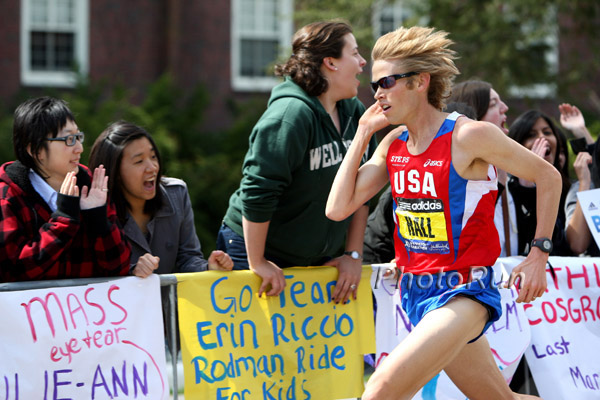The Role Of A Coach / Ryan Hall Makes A Change & I Support Him
By Robert Johnson
October 25, 2010
Real quick, name the coaches of the following Olympic champions:
Kip Keino?
Frank Shorter?
Haile Gebrselassie?
Sammy Wanjiru?
Honestly, I bet 99% of the LRC audience can't name a single coach.
My point isn't that coaches don't matter but rather that the athlete often makes the coach.
Thus, I'm surprised at all at the vitriol that has been directed at Ryan Hall after he announced his decision to leave coach Terrence Mahon and the Mammoth Track Club. The fact of the matter is if it wasn't for Ryan Hall and Deena Kastor, then most people might never have even heard of the Mammoth Track Club or Terrence Mahon.
One of my favorite phrases about coaching is one I invented myself. Whenever quizzed as to why my teams at Cornell aren't living up to my pledge from seven years ago to be a top-10 national program, I reply: "How many national championships did Mark Wetmore win at Seton Hall?"
Without super talent, a coach can't get super results.
Now that Hall has left the MTC, lots of people are throwing out names as to who he should get guidance from. I haven't read a single person mention the name Andy Gerard - the head guy at George Mason. That doesn't surprise me, as his cross teams at George Mason aren't all that great. But the fact of the matter is when Gerard succeeded the masterful recruiter Vin Lananna at Stanford, Gerard orchestrated one of the finest performances in NCAA history. In 2003, he put six Cardinal runners in the top 13 of NCAAs. Yes, six of the top 13 (and the team was led by none other than NCAA runner-up Ryan Hall). If Stanford had lined up against the entire rest of the NCAA in the team scoring, the score would have been Stanford 24, Rest of the NCAA Teams 31.
Now, I'm not trying to propose that Hall should be coached by Andy Gerard. I'm just trying to say that with great talent, lots of coaches can do great things. Conversely, without great talent, coaches can only do so much. Anyone remember how the much-hyped Discovery USA program by FILA worked out? FILA hired famed Italian coach Gabriele Rosa to work with some of the best US hopes in the marathon and not a single one of them did anything really of note. Rosa didn't suddenly forget how to coach. It's just that the talent level of the guys he was working with was drastically higher in Kenya.
Thus, when people are listing names of coaches Hall should be with, they shouldn't necessarily only list coaches who have coached famous athletes. Mahon is ironically the perfect example of this. Before working with Kastor and Hall, Mahon wasn't a famous coach. He was just a 30-something-year-old former 2:13 marathoner best known for being the husband of Olympian Jen Rhines. Now he's coached the two fastest American-born marathoners in history - a 2:19 woman in Kastor and 2:06 guy in Hall.
If Hall had been in another group, everyone would be throwing Mahon's name out there as the coach he has to work with, much like many are throwing Alberto Salazar's name out there now - mainly because he's worked with famous athletes.
The Role Of The Coach
To me, the role of a coach is simple. He should keep his or her athletes healthy, have them improve each year, keep them motivated, and have them peak when it counts most. At the very elite level, being able to bring your best performance when you need it most is the most important aspect of it in my mind.
No coach can reasonably be expected to turn a 2:13 guy into a 2:06 guy.
How much of a difference can a truly great coach make?
Let me introduce you to one of John Kellogg's maxims on coaching:
A very good coach is worth about one second per lap (so a little over 4 seconds per mile) versus the average coach, given statistically significant sample sizes of runners for each coach to work with (to yield an accurate average for the results which reduces the influence of outliers).
So give an incredible college coach a team of 9:10 high school recruits and he could build a team that competes favorably with a similar size team full of former 9:00 high school guys. People may not realize it, but getting 4:20 high school milers to regularly beat 4:15 high school milers requires great college (or post-college) coaching and is about all even the best coaches can do.
I've never really wondered whether the one-second-per-lap figure applies to the marathon, but it probably does. If a marathon was run on a track, it would be just over 105 laps. So a good coach could make a difference of 1:45 or so, meaning a 2:10 guy might beat a 2:08 guy, but a coach probably isn't going make the difference in getting a 2:08 guy to beat a 2:04 guy.
Thoughts On Hall's Change
So what do I think about Hall's change? Fine by him if he wanted to make a change. The biggest role of a coach is to get an athlete to give his or her best on the biggest stage. This fall, Hall didn't even make it to the startling line in Chicago. In Beijing, he clearly wasn't at his best either.
Additionally, to me the idea of racing a half marathon three weeks before a marathon makes little sense on a number of levels. As an athlete, I always wanted to race a half prior to a marathon but as a coach, I'd be worried it's too close to the race and is way too short of a distance to be focused on just three weeks out.
Does that mean I think Mahon is a subpar coach? Far from it. The guy has coached the fastest American-born man and woman at the marathon in history. End of story. (Not to mention under Mahon Ryan moved up to the half-marathon and marathon. Ryan spent much of his collegiate career convinced he was a miler).
But honestly, sometimes change for change's sake is good. I'll use an example from another sport to support my argument.
Anyone remember when Roger Clemens went from the Red Sox to Toronto and proceeded to win two straight Cy Young awards? Well, Boston fans were irate after the fact. But the truth of the matter is in his final four seasons in Boston, Clemens was far from spectacular. In two of his final four years in Boston, Clemens had an ERA of over 4.00. In the other two years, he had a losing record. Whatever it was - the change of scenery or motivation from being snubbed by Boston (or maybe just steroids/HGH) - something propelled Clemens to another decade of greatness, as in the next ten years, he only had an ERA over 4.00 twice.
I know one thing about this whole Ryan Hall coaching change affair. I certainly disagree with Universalsports Joe Battaglia, who ripped Hall, saying that "Hall's primary focus is no longer on winning" and said that Hall has lost his competitive drive.
In reality, I think just the opposite of Battaglia. To me, it's a good and positive thing that Hall no longer views his races as a success or failure depending on whether he won or lost, because a runner needs to have process-oriented or time-oriented goals, not place-oriented goals, as the fact of the matter is running is a sport where one athlete's all-out performance is largely independent of another's all-out performance (additionally, given Hall's supremely religious nature, I think it's unfair for anyone to take too much out of a post when Hall is describing things in larger-than-life terms).
For example, suppose Hall had gone out and run an American record of 2:05:10 in Chicago but finished third to Wanjiru, who ran 2:04:55. Should Hall really view himself as a loser and failure? Maybe in the media's eye and the uninformed public's view, but not mine.
The world of marathoning is unbelievably deep right now and it's very unlikely that an American will win a major any time soon. It's certainly possible (Meb won in New York last year, after all) but not likely, and thus if Hall is getting down on himself all the time for not winning, that wouldn't be productive. The dream of a major win is certainly what motivates Hall to train at an astronomical level and motivates us fans to invest so much in supporting him, but everyone needs to understand just how difficult it is to win a major in the year 2010.
The fact of the matter is if there was a single pro marathon race each year with one hundred marathoners, each of whom was given a $200,000 appearance fee for showing up, and then the winner took home $10,000,000, I'd be willing to bet we'd never, ever see an American winner in my lifetime. Eleven guys this year have already run faster than Hall's PR of 2:06:17. Last year, twelve guys beat his PR. If they all showed up in the same race in shape, how could we possibly expect him to win?
Conclusion: Hall Needs Our Support
The truth is Hall is the fastest American-born marathoner in history by a long shot. He finished fourth in New York last year and Boston this year. He needs our support.
In my mind, Hall is making a bold move, as he doesn't want to stagnate and get stale. Do people want him to wait two or three years past the time it's obvious that a change needs to be made, like was the case with Alan Webb? 2012 will have come and gone if he does that, and Hall's best chance for Olympic glory likely will come in 2012 when he's 29.
I agree with Ryan when he wrote, "It takes faith and the courage to risk failure in order to realize one's destiny."
He's daring to be great and should be commended.
PS. On a personal note, I know my brother ran way faster running largely by himself than he ever did in a team setting. Ryan, if you are reading this, remember it's not the critic who counts.
Questions, comments? Email Robert at robertjohnson@letsrun.com.
|
|
|
|
|
|
Runner's World &
Running Times

Combined Only $22
a Year
Save $87

Running & Track and Field Posters
Great Offer: Nike Lunar Glide Sale Multiple colors of this shoe available.
*Nike Air Max Moto 7 Get 2 Pairs for a Crazy $112

